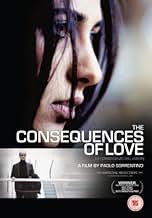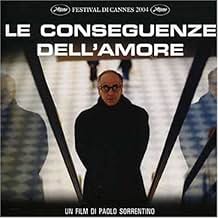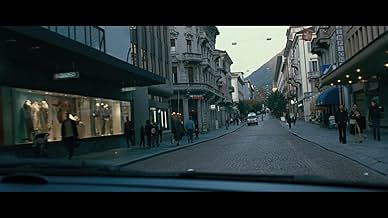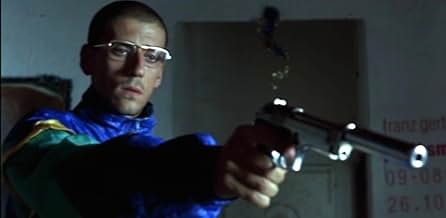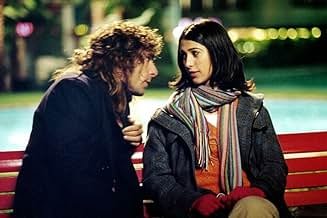La vita di un uomo introverso cambia completamente quando egli si ritrova attratto da una giovane barista.La vita di un uomo introverso cambia completamente quando egli si ritrova attratto da una giovane barista.La vita di un uomo introverso cambia completamente quando egli si ritrova attratto da una giovane barista.
- Premi
- 20 vittorie e 21 candidature totali
- Pippo D'Antò
- (as Enzo Vitagliano)
Recensioni in evidenza
A middle-aged gentleman just sits in the hotel lounge, looking intelligent and distant, distinguished but also downright arrogant and rude. He never speaks to staff, or other guests, even, despite having been in residence for ten years.
He does something, without fail every Wednesday - and a couple more things the same day, once a year.
The sort of gentleman one could chance upon in any hotel, pretty well anywhere in the world. A poker-face of nothingness, smoking his life away, his concentration on his inner world only broken by the burned out cigarette stub. The excellent acting of Toni Servillo, coupled with the sublime direction of Paolo Sorrentino, employing a Kubrick style of slo-steadicam, with an ever sense of steady dread.
Always compelling rather than propelling, the story unfolds with Servillo's character, Titta, as he leads this strictly regimented life until confronted by the stunning Sofia, the barmaid. She looks at him straight in his eye and states that she's made his bed, served him this and that, had always been polite and courteous for the three years she's worked there. And he's never had the decency to utter a single word to her.
Instead of being nice back or even saying anything at all, we're aware that a flicker of something human has sparked within him. But, as the very title states, this lowering of his guard could very well be his downfall.
What does, however inflame this film and raises it even higher are the occasional flurries of activity. Titta hardly does anything more than almost nothing (driving one block, or looking around - not buying, though - a shopping mall) is accompanied by very loud punk rock music. This is unsettling - is this a dream he's having? Does he yearn for the fast life? Are the people he meets from a past, productive life? Do the characters he encounters then have any relevance to him - and to his situation now? The scenes look very real; the mood and ambiance are definitely not.
Moving on into the realms of more conventional crime drama, but still with a cool unease and an almost Memento meditative pace, the whole reveals lives and opportunities lost. Of redemptive longing and knowing one's own fate. This is an intelligent film that refuses to retread a potentially familiar path.
If in the U.K, BBC4 shows it again, wrap yourself inside it, be enveloped by it. You'll want to watch all of it, not that you know why but you'll be glad that you did. It's only 90mins. I've seen The Consequences... four times now, and I never tire of it. The ending will have you quietly shocked and amazed, too.
Somewhere at the beginning of the film, a man walking on a pavement turns to look at a woman and in doing so hits a lamp post. The audience erupts into a volcano of laughter innocently. But isn't that brief shot the synopsis of the film, that entertains you for 2 hours? While the film is a wonderful blend of black comedy (e.g., using a stethoscope to listen to a neighbor's conversation in the adjoining hotel room), the film builds on what Buster Keaton and Jacques Tati had introduced to cinema earlier--stoic faces that leads to comedy quite in contrast to the equally intelligent world of Robin Williams or the heartwarming Danny Kaye. A sudden frenzy of activity transforms an otherwise stoic character while moving money from the hotel to the bank is reminiscent of Tati's works.
But the film is not mere comedy. The anti-automation statement (cash counting and the reaction of the bank staff to the statements relating to it, the dummy that acts as an ineffectual warning to the speeding lady, the reference to "Moulimix" as the fictitious "company" he works for, etc.) are several cues that the director is offering a loaded comedy to the viewer. Laugh, yes, but reflect on it and enjoy further..
The movie's strength lies in is brief, staccato script (by director Paul Sorrentino) that offers comedy that is mixed with philosophy ("Truth is boring," "Dad is dead, but nobody told him," "Bad luck does not exist--it is the invention of the losers and the poor". Then the director goes on to provide you with a fascinating lecture from the main character on insomniacs. You will not sleep through this lecture.
Sorrentino provides entertainment pegged to the subject the Italians know best--the Mafia. It is an existential mafia film.
There is a loaded philosophical sequence where a young girl, sitting opposite the lead character Titta Di Girolamo, reads aloud a passage from a book: "Whatever he wants can happen. What a fine mess. That is the advantage of using memories to excite oneself. You can own memories, you can buy even more beautiful ones. But life is more complicated, human life especially so, a frightening, desperate adventure. Compared to this life of formal perfectionism, cocaine is nothing but a stationmaster's pastime. Let us return to Sophie.. We become poetic as we admire her being, beautiful and reckless, the rhythm of her life flowed from different springs than ours. Ours can only creep along, envious. This force of happiness both exciting and sweet, that animated her, disturbed us. It unsettled us in an enchanting way, but it unsettled us nevertheless. That's the word." The reaction of Titta to the passage is interesting. Titta is himself a cocaine addict. Titta looks at the barmaid of the hotel-his own "formal perfectionism." The following sequence is of Titta calling his own wife and daughter on the phone--a conversation filled more with silence than words. They, too, are Titta's "memories." The final sequence of the film is of Tittas' best friend Dino Guiffre working alone repairing a fault on an electricity pylon in biting wind in a snowy landscape--recalling his own best friend Titta. This is a film about friendship that transcends the mafia.
Since "Truth is boring", the director provides a dessert as part of the fine meal of superb acting (Toni Servillo), good music, clever camera-work (Luca Bigazzi), a beautiful, enigmatic actress (Magnani, grand-daughter of the great, immortal beauty Anna Magnani) and powerful script. The dessert is for the viewer to figure out the truthful feelings of Titta, towards his family members, towards his hotel guests, towards the bar girl, towards the mafia, towards the bankers, towards the hotel owner, and towards his best friend Dino. (Assuming that the viewer accepts the eventuality of how Titta recovered his suitcase from the goons, how does he get inside his car and get it covered with its synthetic cover while he is still inside it?) Perhaps it is Sorrentino's admitted love for the literary works of Louis- Ferdinand Céline that has sculpted the character of Titta. The film's end will remain an enigmatic one for a reflective viewer.
Lo sapevi?
- QuizThe book the girl at the table reads is Louis-Ferdinand Céline's "Voyage au bout de la Nuit" (1932).
- BlooperThe barrel of the tracksuit-clad assassin's fired gun, lying on the hotel mattress while the assassin is packing for departure, appears defective, i.e., rubbery, as the silencer barrel is angled downward. Moments later, after he picks up the gun and points it at the hotel room door, the barrel appears longer and straighter, as it was in the earlier scenes.
- Citazioni
Titta: In the world there's a certain kind of cult, with men and women of all social classes, of all ages and of all religions. It is the insomniacs cult. I'm part of it. For ten years. Those who don't belong to the cult sometimes tend to say: "If you can't sleep, you can read, watch TV, study or do something else". That kind of phrase is deeply annoying to the members of the cult. And the reason is simple. Cause the insomniac has only one obsession: to sleep.
I più visti
- How long is The Consequences of Love?Powered by Alexa
Dettagli
- Data di uscita
- Paese di origine
- Sito ufficiale
- Lingua
- Celebre anche come
- The Consequences of Love
- Luoghi delle riprese
- Aziende produttrici
- Vedi altri crediti dell’azienda su IMDbPro
Botteghino
- Budget
- 2.000.000 € (previsto)
- Lordo in tutto il mondo
- 2.556.056 USD
- Tempo di esecuzione1 ora 40 minuti
- Colore
- Mix di suoni
- Proporzioni
- 2.35 : 1
Contribuisci a questa pagina


![Guarda Trailer [OV]](https://m.media-amazon.com/images/M/MV5BYTE4NzdmOGQtOTU4OC00YTJlLThiYzQtYjkwZWZlMDEzMzVjXkEyXkFqcGdeQXRyYW5zY29kZS13b3JrZmxvdw@@._V1_QL75_UX500_CR0)
